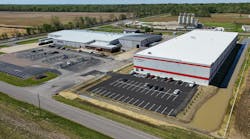There were several factors at work in 2018 that helped Group Michelin record a slight increase in overall sales — up 0.3% — in the face of a “difficult economic environment.”
The company recorded net sales of 22.02 billion euros ($25.3 billion), up from 21.96 billion euros in 2017. Net income dropped just shy of 2%, from 1.69 billion euros to 1.66 billion euros.
CEO Jean-Dominique Senard said, “In 2018, in a difficult economic environment, Michelin demonstrated its ability to increase operating income and sustain the improvements in structural free cash flow achieved in recent years. The year also saw faster deployment of the Group’s strategy, with the acquisitions of Fenner and Camso, and the creation of the TBC wholesaling joint venture in the United States. These transactions have strengthened the Group in key markets and provided new opportunities to create value.”
The company says its partnership with TBC Corp., which included the creation of NTW Wholesale, gave it “greater access to the North American market.”
The overall sales picture
Michelin pointed to three key factors that contributed to its 2018 sales performance:
- Higher volumes. Michelin says volumes increased 0.9%, or by 195 million euros. There was also a 267 million euros benefit from the consolidation of Fenner PLC (a maker of conveyor belts and polymer products for the mining industry) and the deconsolidation of the Tire Centers LLC (TCi) after the creation of NTW.
- Favorable price-mix effect. There was a big boost thanks to the price increases introduced in 2017. Michelin says the “highly favorable price-mix effect” netted 444 million euros in 2018. Prices contributed 255 million euros, while the mix effect added another 189 million, “reflecting the still highly positive product mix, the favorable impact of the rebound in the mining business and the decline in the percentage of original equipment business in the sales mix.”
- Currency. This was a big one, causing a decrease of 838 million euros. It primarily was caused by the rates of the U.S. dollar versus the euro in the first half of the year, as well as the currency crises in Argentina, Turkey and other emerging markets in the second half of the year. (To demonstrate the effect of currency, Michelin says if its 2018 results were calculated using 2017 exchange rates, the company would have recorded 22.87 billion euros in sales, compared to 22.02 billion euros.)
The effect on cash flow
Michelin’s free cash flow dropped by 2.67 billion euros in 2018. In 2017 the company had 662 million euros in free cash flow. In 2018 it fell into the red, -2.01 billion. The cause: acquisitions. (Michelin’s cash offer for Fenner was $1.7 billion. Michelin paid $1.45 billion for Camso. And Michelin contributed $630 million in cash as part of its joint venture with TBC.
The company’s net debt grew from 716 million euros in 2017 to 3.7 billion euros in 2018.
A look at the segments
Michelin breaks down its tire sales into three segments (and the company realigned those segments in 2018.) Here’s a look at their performance:
| Segment | 2018 sales in euros | 2017 sales in euros |
| Automotive (which includes passenger tires) | 11.34 billion | 11.95 billion |
| Road transportation (which now includes replacement light truck tires) | 5.85 billion | 5.95 billion |
| Specialty businesses (which now includes construction truck tires) | 4.84 billion | 4.06 billion |
| Total | 22.02 billion | 21.96 billion |
In the automotive category, Michelin says the 5.1% drop is “mainly due to a scope effect (TCi) deconsolidation and adverse movements in exchange rates.
The company pointed to the steady enhancement of its product mix, and noted its sales of tires 18 inches and larger grew 10%, in a market that was up 9%.
Sales in the road transportation category dropped 1.6% for the year.
Unlike the other segments, the specialty business actually grew in 2018 — dramatically. It was up 19.1% from 2017.
“The increase in segment operating income corresponded to the robust growth in volumes led by the sustained rebound in demand for the Group’s mining tires, the solid performance of the other businesses, the consolidation of Fenner over the last seven months of the year, and a strong price-mix effect that offset unfavorable exchange rate movements.”


